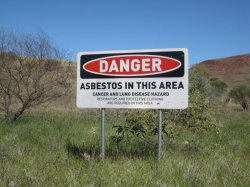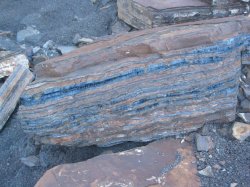Asbestos is far from the low risk substance you believe it to be.Exposure to very little asbestos can be the cause of a fatal tumour.I happen to have presented a major study on asbestos to a medical gathering in 1973.Basically everything was known then.
I don't doubt your knowledge one little bit. The same is true of diesel engine particulates. They are known (not suspected, known) to be highly carcinogenic. Diesel particulate filters are installed in all modern diesel engined cars and knowing that makes you feel all good and fuzzy inside doesn't it? Diesel though generates a lot of solid particulates that block and clog a filter fairly quickly. Far quicker than the duration between regular services, thus there has to be an automated way of unclogging the filter else the engine will be strangled and refuse to work. In modern engines, this is achieved by injecting raw fuel straight into the exhaust ahead of the filter to ignite, raising the temperature to way over 600°C which is enough to burn off the particulate ash matter enough to pass through the filter and reduce the backpressure. It's called Diesel Particulate Filter Regeneration and you'll know it's happening when you see the big orange light on your dashboard.
Those following you on the road will know it's happening because they'll be covered without warning in a massive cloud of black smog usually just after you've taken off from the traffic lights. In a normal world, this is fine. Diesel is perfectly suited to commercial vehicles, heavy industrial equipment, static powerpacks and public transport like ships, trains, boats etc. It's brilliant for those uses. Efficient, low maintenance, reliable. Everything you want. In those uses, the filter regeneration isn't even a problem because it happens naturally on long high speed runs well away from populated areas, so the soot falls to the earth and is simply absorbed into the environment.
The modern problem though comes in because diesel has been adoped for everyday commuter vehicles people choose to drive in built up residential suburb commuter traffic. An environment wholly unsuited to the diesel combustion cycle, yet we've forced it to work in this environment with turbochargers and clever gearboxes that can almost replicate the performance of equivalent petrol engines in the same environment. The problem though, is that without ever being driven on long distance, high speed runs, the particulate filters have to self-regenerate in the middle of traffic in suburban roads. I see it happening everyday and I bet everyone does. You see that brand spanky new Audi Q7/BMW X5/Range Rover/Jeep Cherokee take off from the lights in front of you and then without any sign of rapid acceleration, a great big dirty plume of black smoke gushes out the exhaust pipe totally inconsistent with what you expect from an otherwise very young model car. That's the particulate filter doing it's thing and you've just been showered in the diesel equivalent toxic soup of a bag of James Hardie super six fencing material from Wittenoom.
Some cities in the world are just waking up to this massive future potential health problem. Amsterdam has completely banned diesel engined cars from entering the CBD city limits at all times. Paris & London are considering the same thing. Turn your watch forward about 20 years and the same will start happening here when the spate of black lung cancer cases wakes the politicans up to the horror the rush to diesel was in the early 2000's.

















